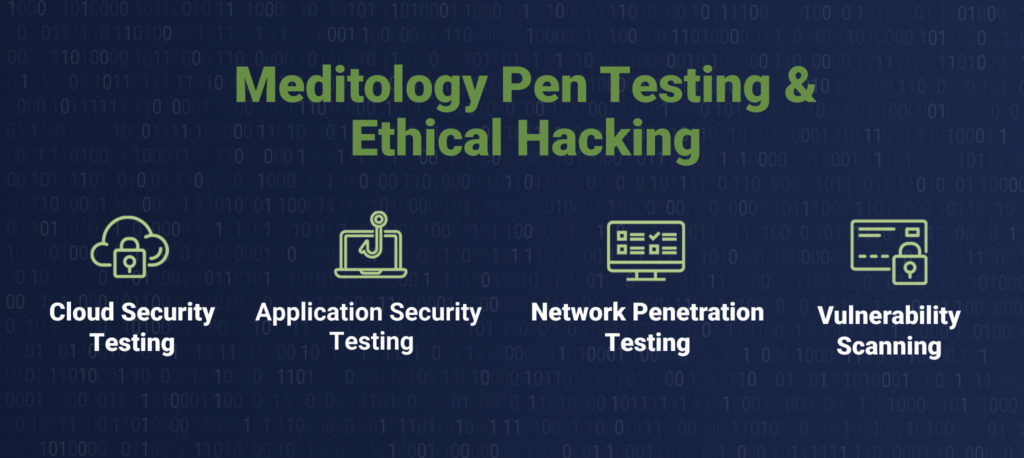
BLOG
Why you should get hacked...on purpose
Published On February 21, 2023
Beating hackers to the punch with penetration testing
How do you know a hacker when you see one? Chances are, you won’t. Today’s hackers are increasingly adept at remaining invisible. As their detectability erodes and their tactics become ever-more covert, the magnitude of their damage seems to increase in an inverse but equally significant proportion.
But what if a skilled hacker was on your side of the fight against breaches? Wearing a smile, holding a coffee, genuinely in your corner? That’s exactly what pen testing is about. Informally coined white hats, a pen tester is an ethical hacker who is skilled at beating bad actors to the punch. They do this by harnessing an attacker’s real-world tactics, in a way that identifies your organization’s vulnerabilities— so that you can address them before a malicious attacker exploits them. Pen testing can help to evaluate whether your controls are actually effective, identify gaps for remediation, test your detections and responsibilities capabilities, and surface opportunities to prevent attacks. In turn, you can gain new confidence in your organization’s security.
If you’ve ever considered a pen test for your organization or are looking to learn more about what differentiates one pentester from another, read on. In the following paragraphs, we answer some important and frequently asked questions.
Does pen testing actually work?
Pen testing can be an effective means to uncover and address vulnerabilities in an organization’s network, infrastructure, and solutions. Many organizations are beginning to realize this potential, with the global pen testing market expected to grow at a compound annual growth rate of nearly 16% through 2028.
Many organizations are not truly sure of the strength of their security posture until it’s too late and a breach occurs. Pen testing takes away this uncertainty by simulating real-world attacks and surfacing security exposures. By identifying vulnerabilities, the organization can then take steps to close gaps, maximize control effectiveness, and prevent incidents that could put sensitive patient data at risk.
Pen testing should be viewed as a complement to, rather than a replacement for, other important cybersecurity efforts like certifications, security assessments, and routine control audits. All of these aspects of a rigorous and effective cybersecurity program should work together in an integrated fashion to elevate security posture and protect critical data.
How is pen testing unique in healthcare?
Pen testing is a fruitful and highly beneficial exercise, but a pen test is not without risk. In healthcare, the potential ramifications of a pen test gone wrong are even more extreme— with the potential to cut patients off from critical health appointments or life-sustaining systems and equipment. In fact, the US Department of Health and Human Services recently issued a warning around automation in cybersecurity in healthcare, including around pen testing.
In healthcare, more than in any other sector, a pen test must be conducted with sensitivity to the technical, clinical, and regulatory realities that exist for some of the network. To truly reap the benefits of pen testing while safeguarding systems, it is crucial to work with a partner experienced in the healthcare ecosystem. A healthcare-specialized pen tester is best equipped to navigate, scope, and safely test in a clinical environment in order to help you detect holes in your security program.
What should I look for in a pen tester?
It shouldn’t be surprising that healthcare-specific expertise is the first characteristic a healthcare organization or vendor should be looking for in a pen tester. Healthcare-specific knowledge will not only enable you to safely execute a pen test in your delicate clinical environment; it will assure your partner is looking out for the vulnerabilities that are most commonly found in healthcare-specific attacks. Finally, it will ensure that the entire pen test is executed in a way that is congruent with healthcare’s most important standards and regulations—including HIPAA, HITRUST, NIST, HICP, OCR CPGs, and others.
The second characteristic to look for is a proven testing approach that has been safely and effectively performed hundreds of times before. Your partner’s testing methodology should be thorough and efficient, with a strong track record of success. The best methodologies use a combination of proprietary tools and manual techniques to simulate real-world threats in the most robust way possible. It is important to remember that the methodology includes the report. Look for a partner that provides comprehensive reports around critical vulnerabilities, root causes, and more, while offering tangible recommendations for corrective action.
Remediation is critical to the success of any security effort, and a healthcare-specific partner can save time by performing additional tests after you have taken steps to remediate. With an understanding of your systems and the gaps that exist, your partner can then re-test your systems to affirm the strength of your remediation efforts.
All of these characteristics are important for successful penetration testing in healthcare—but they should be reflected in a partner you actually enjoy working with. Above all, your partner should be collaborative, working with you to understand your risk tolerance and tailor their approach to your needs.
That’s what we do at Meditology. Our penetration testing and ethical hacking services are backed by our proven methodology and years of focused expertise in healthcare. By examining multiple avenues of attack and entry and seeking out vulnerabilities that are most common in the healthcare ecosystem, we empower our clients to remain ahead of potential breaches and focus their remediation efforts, which are powerfully enabled by our full suite of cybersecurity, risk, and compliance services.

Ready to discover how penetration testing and ethical hacking can transform your cybersecurity approach? Speak to an expert to learn more.